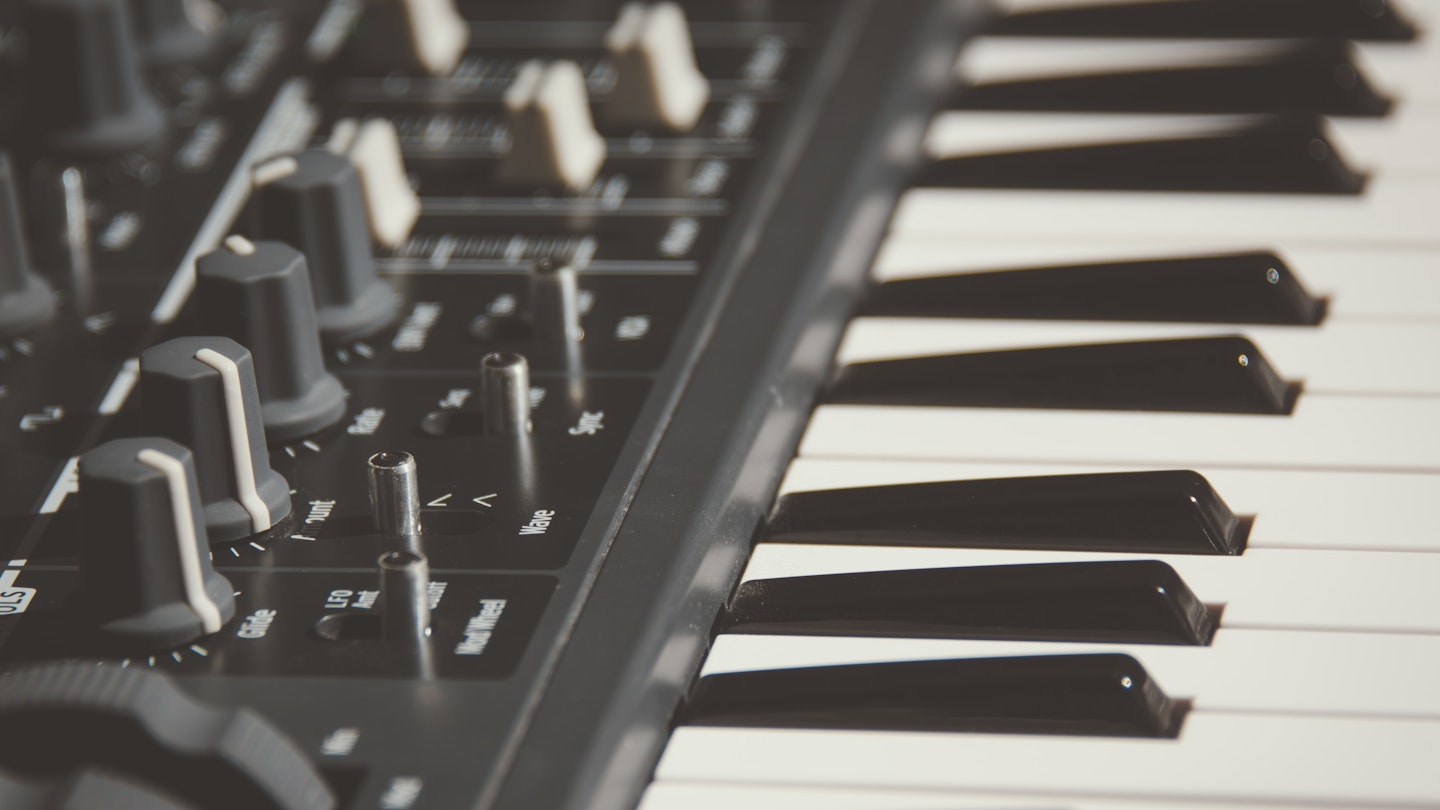If you’re getting started with music production or its relevant software, you’ve probably heard the word MIDI thrown around a lot. MIDI stands for Music Instrument Digital Interface and is used by musicians and producers to communicate signals between devices in order to trigger sounds.
Using MIDI, audio data can be transferred between MIDI devices, such as keyboards and synthesisers, or played from a virtual instrument onto a digital audio workstation (or DAW). Using the latter, the articulation or length of the note can be customised according to the needs of the user. Musicians like MIDI for this reason, as compositions may be crafted and moulded to shape on screen rather than with continuous live takes.
DAWs will allow users to draw the notes from the instrument into the track with a computer mouse, but most producers opt for a MIDI keyboard instead.
What are the benefits of a MIDI Keyboard?
Many musicians choose keyboards as part of their MIDI setup for a natural feel when playing notes, as physically pressing the keys will apply a certain live articulation difficult to replicate with a mouse. By doing so, MIDI keyboards bridge the gap between naturally played music and a digital platform, allowing for an overall cleaner and less robotic sounding result.
Some keyboards also include MPC pad sets for beat production, again for the benefit of a natural feeling input onto the DAW.
In the same way that typing out an email on a musical keyboard would be a dubious proposition at best, attempting to perform music on a laptop can be equally as laborious. While not impossible, to play clear and coherent melodies on your software, a MIDI keyboard is an incredibly useful tool, as compositions can be formulated and then played in rather than drawn in one note at a time.
This will be especially beneficial for more intricate music played into MIDI, or if you’re just wanting to hone your keyboard playing skills.
Having said that, should you have a limited understanding of musical theory or piano playing technique, a keyboard may seem a daunting piece of kit. To some, the visual representation of music drawn into the software provides sanctuary, allowing for easier layering and construction - whatever works for you.
The best MIDI keyboards
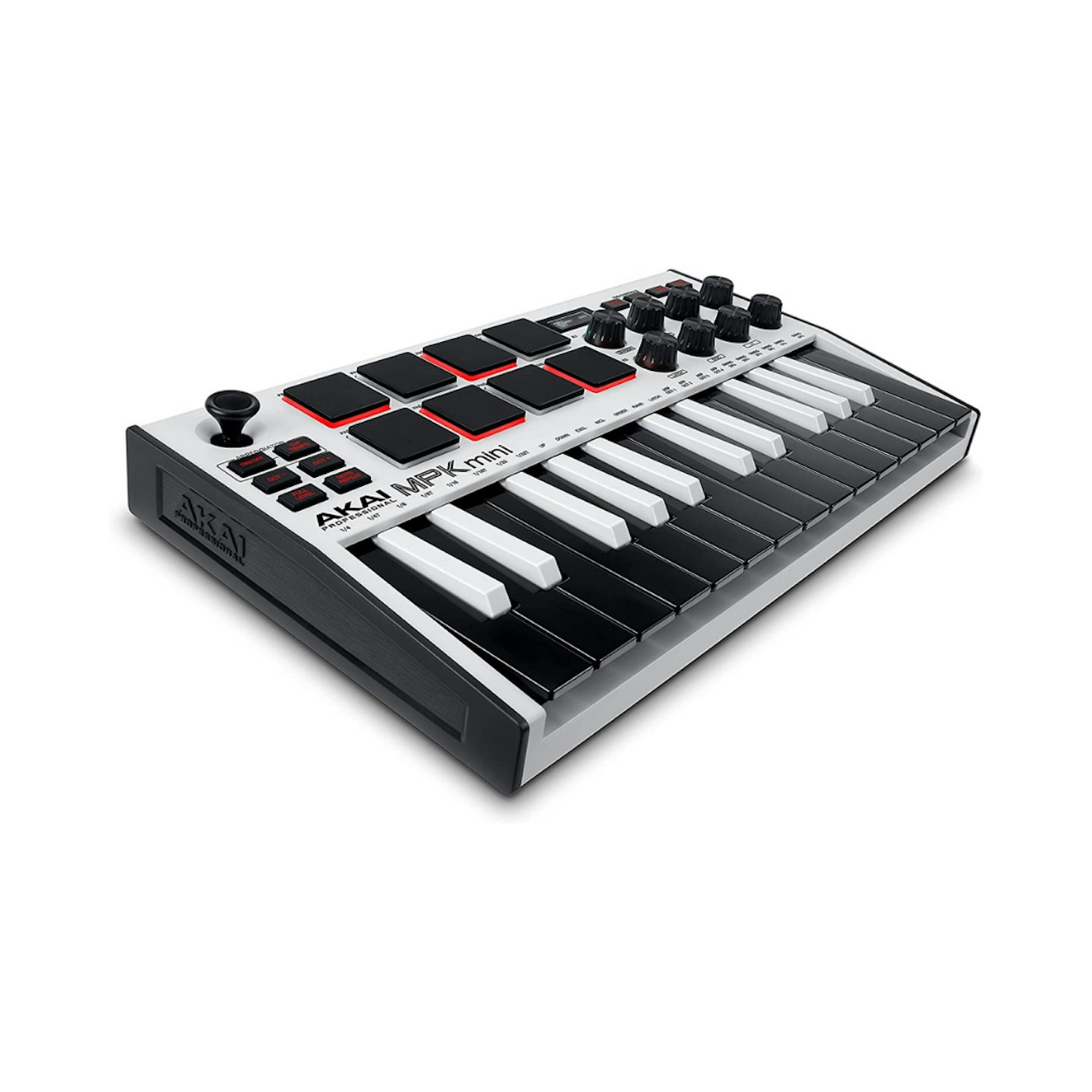
This MIDI Keyboard from Akai is the ultimate in portability while still packing a great punch with an array of bells and whistles. This Akai keyboard only houses 25 keys to keep the product small and lightweight, but the low key count allows this product to slip in and out of a backpack with considerable ease, making it the perfect choice for a travelling music producer wanting to create on the go. All keys are velocity sensitive for a natural sounding result, with a four-way thumb stick for pitch and modulation control.
This Akai keyboard__ also features eight backlit MPC drum pads for beat production, with full level and repeat buttons. Again, these pads are velocity sensitive on the Akai for more intuitive sample or beat making, allowing for drum programming with a more natural touch. Alongside the pad deck, the keyboard also presents eight 360 degree knobs to simulate a more realistic mixing station, as you would find on a professional desk. These knobs can be assigned to each plug in on your track, with opportunities for mixing and synth calibration all from the keyboard. To hook up to your laptop, connect via single included USB cable. It’s that simple.
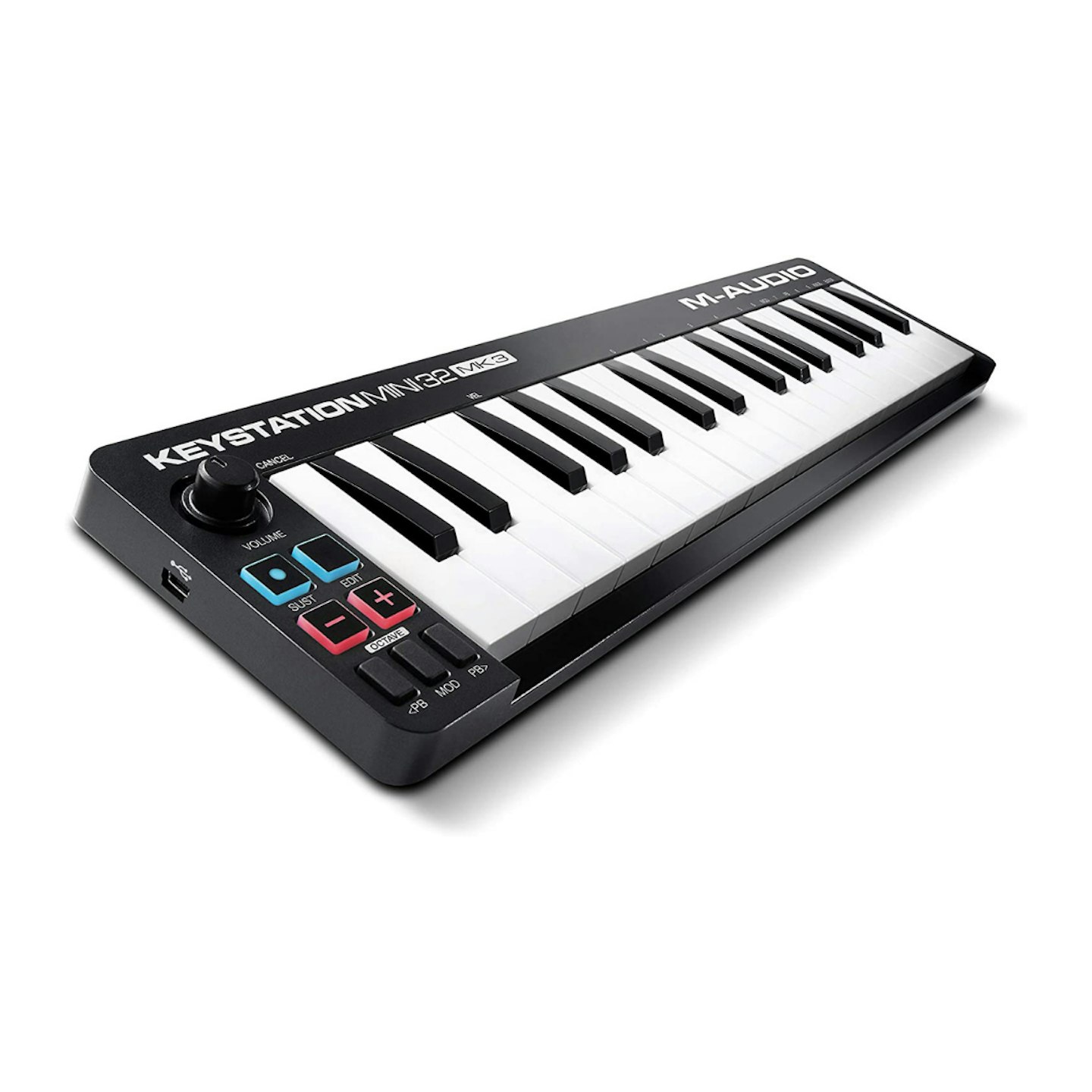
If you’re looking to upgrade your audio workstation on a budget, this MIDI keyboard from M-Audio is a great affordable option. Featuring 32 velocity-sensitive keys, this product is larger in length than the Akai, but with a slimline frame, it remains small and light enough for great portability.
For pitch bend and modulation adjustment, the Keystation 32 features three buttons, along with octave adjustment to extend the keyboard’s range and a volume adjustment stick. The Keystation also features a sustain button to simulate real piano sustain. The Mini MK3 32 also comes with a digital suite to get you going with production, including MPC Beats software, and the keyboard is all yours for just £39. Bargain.
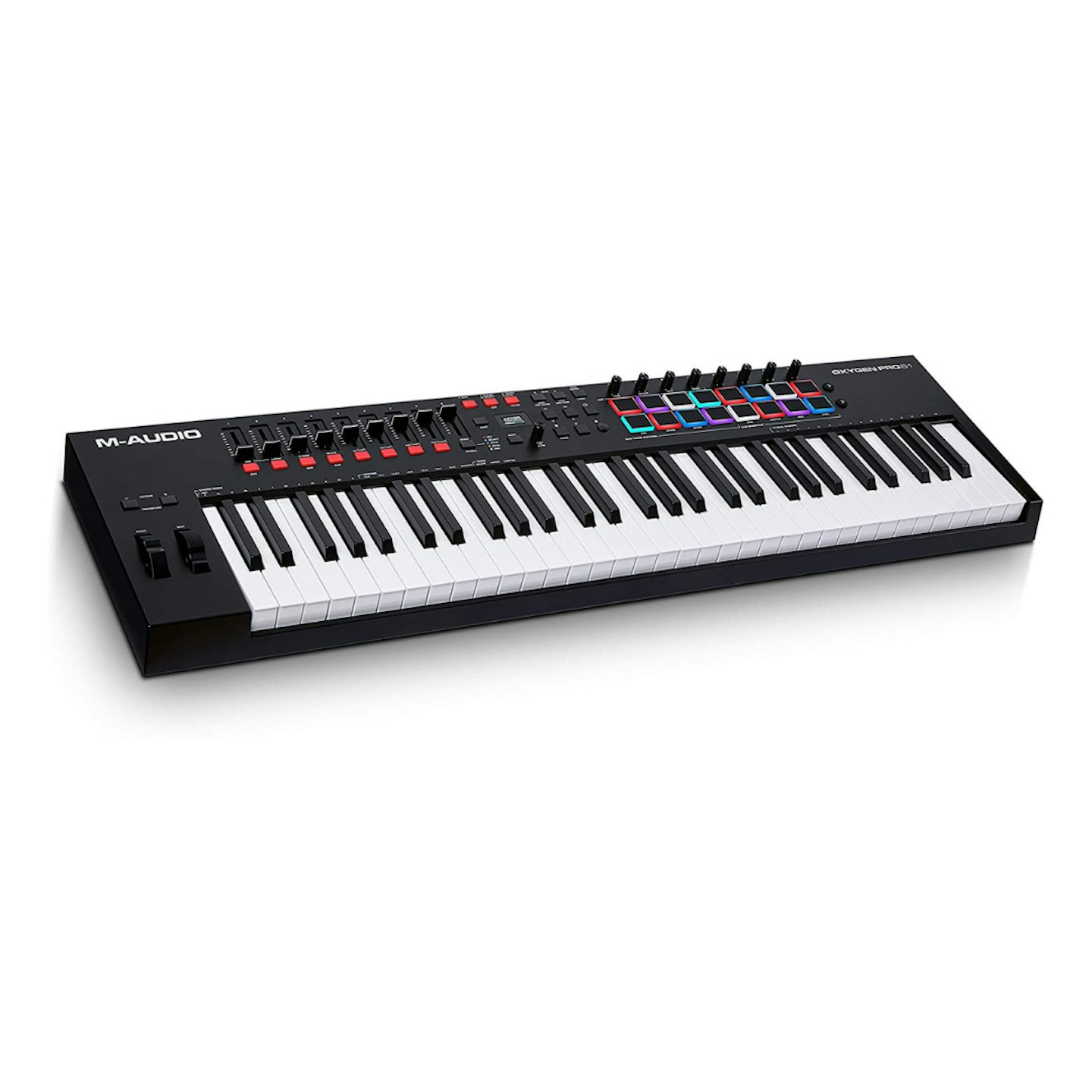
For the last word in MIDI control tech and practical application in your audio workstation, you’re looking at the M-Audio Oxygen Pro 61. Features aplenty, this keyboard presents 61 velocity-sensitive keys - semi-weighted for realistic piano simulation - and aftertouch: intelligent MIDI data transferred in response to pressure applied after the key has initially been pressed, allowing for vibrato and musical techniques to be performed.
The keyboard holds eight knobs and nine faders, all assignable to different plugins or DAW controls for the ultimate professional mixing desk feel and tactile MIDI experience.
Beat production? You’re covered. The Pro61 features 16 velocity-sensitive drum pads for MIDI assignment, all RGB backlit to help with organisation. It also has note repeat capabilities and soundboard potential. You’re covered on the software front, too: included in the package buyers will receive industry-standard digital audio software including MPC Beats, Ableton Live Lite and more, so you can get started with production straight out of the box.
The Pro61 offers connectivity to any computer via USB , but also features a five-pin MIDI out port for connection to other MIDI hardware such as synthesisers, whereby the latter can be controlled through the Pro61. For synthesiser effects, this keyboard from M-Audio also features smart scale modes, an arpeggiator and pitch and modulation wheels to find the perfect tone. Want this tech in a smaller package? The Oxygen Pro comes in two smaller key lengths: 49 and 25, as well as the Pro Mini.
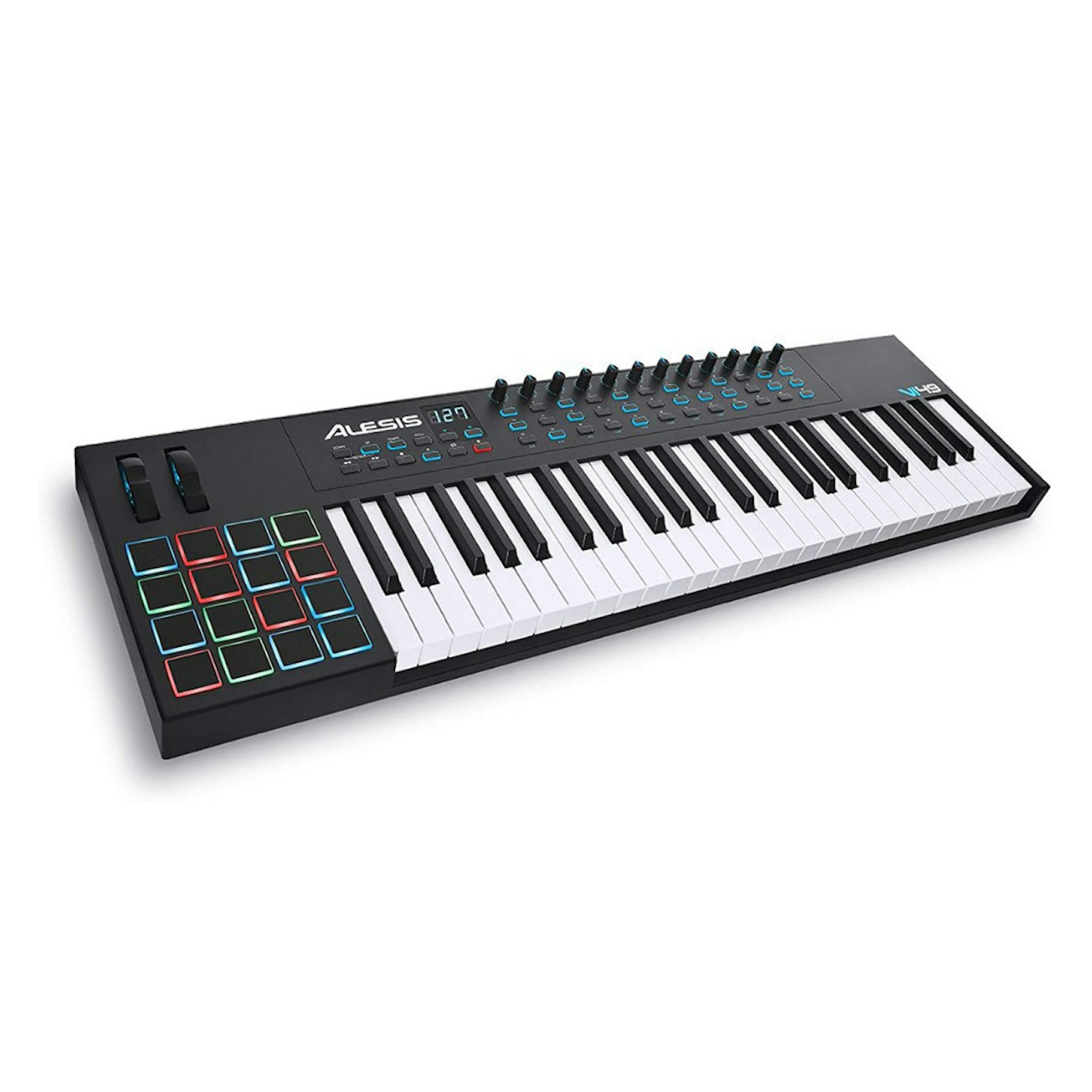
Another high-end MIDI keyboard controller, the Alesis features much of the same equipment as the M-Audio, including 16 pads, 12 assignable knobs for plugin tweaking and 36 buttons.
Like the M-Audio keyboard, this product is available in three different sizes to suit your audio production and lifestyle needs: 25 keys, 49 keys and 61 keys. This 49 key edition is perfect for a medium-size audio setup, as it houses all the relevant and necessary equipment but is compact enough to sit on a desk and not take up too much room.
The keyboard provides seamless visual feedback through an LED screen as well as illuminated buttons and pad backlight for low light environments.
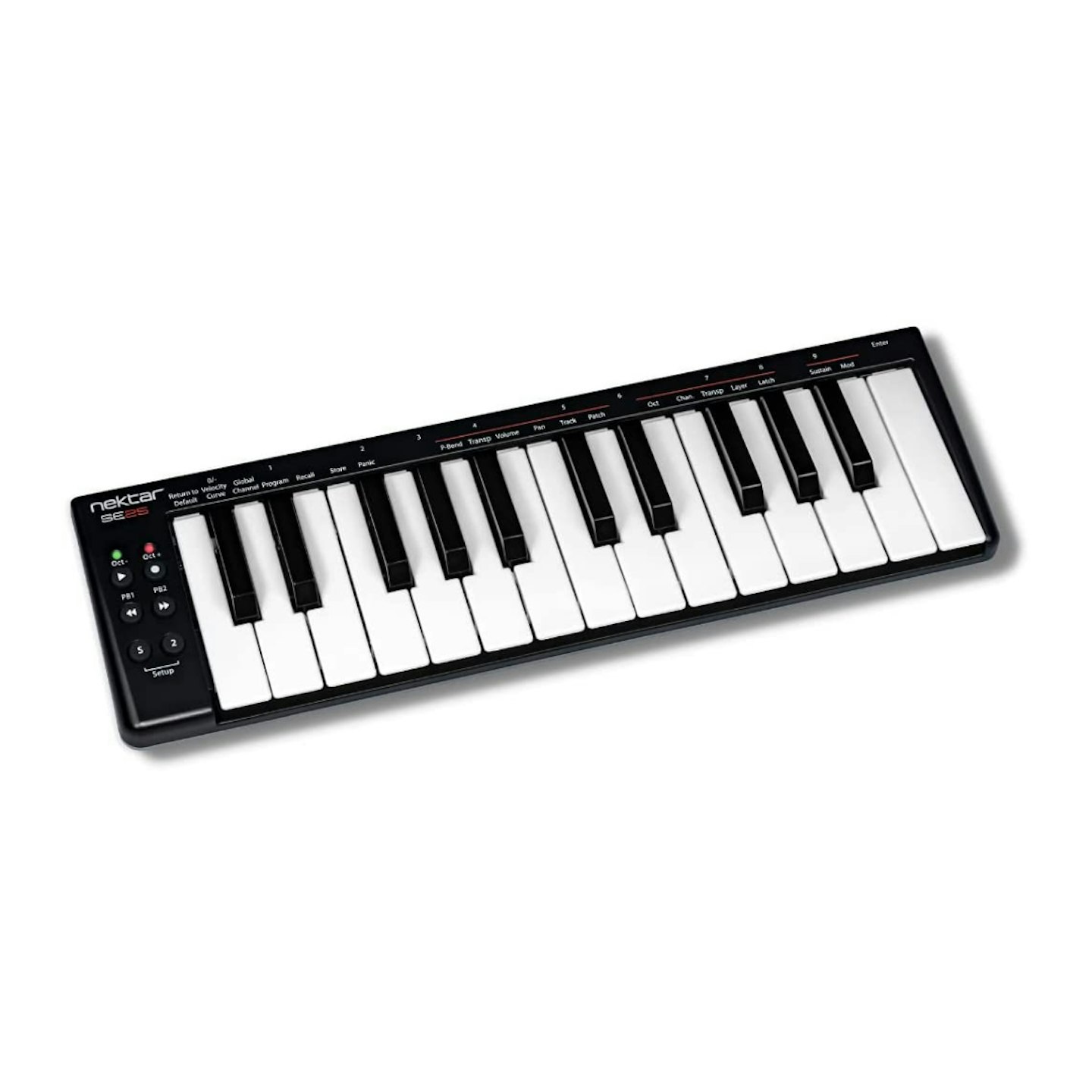
Sometimes the keys are all you need - if pure simplicity is what you’re after in a MIDI keyboard, this edition from Nektar is for you. Ultra-streamlined with only the keys and a handful of buttons to house, this keyboard is as portable as it gets, weighing just 400 grams and being only 1.1 cm thick. Slip this keyboard into your bag after you're done and you’ll forget it’s even there.
Although light on features, the Nektar is not entirely without them. The ‘Part 2’ feature button will momentarily shift your octave and layer harmonies or oscillate between keyboard configurations as you play. Pitch bend, MIDI volume, and sustain are all here on the Nektar and can be operated and customised via the six buttons for optimal simplicity. The 25 keys are of course velocity-sensitive, but with three velocity curves available to suit this mini board to your playing style.
What is MPC?
MPC stands for Music Production Centre, and was developed as a tool specifically for the benefit of sampling and beat production, featuring a number of pads that trigger drum sounds once pressed - much like the keys on a MIDI keyboard.
Through the simplicity of a pad grid, rhythms can be built upon touch using any programmed sound. Despite first being developed over 30 years ago, MPCs are still widely used and featured on many MIDI keyboards, often now on MPC Beats - an in-house beat making software.
What is a Digital Audio Workstation?
A Digital Audio Workstation. or DAW as it is commonly known, is an audio production software platform that is downloaded onto a computer. Music can be recorded directly onto a DAW, and once there can be crafted and edited using the virtual tools provided by your chosen software.
Essentially, a DAW condenses the power and capability of a studio mixing desk onto your computer, making audio production easier and more accessible.
READ MORE
The best budget microphones for podcasting, streaming and more
